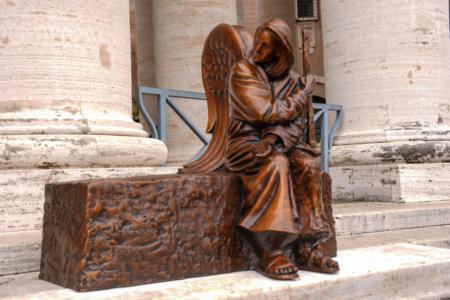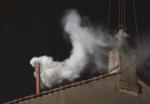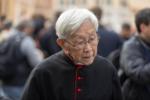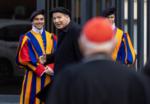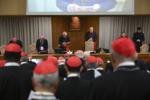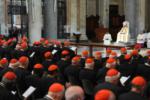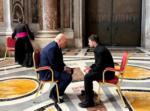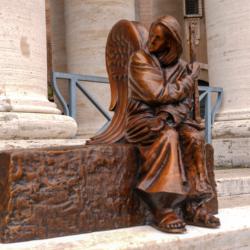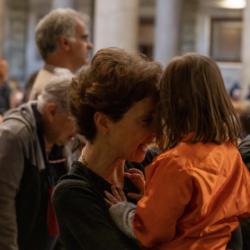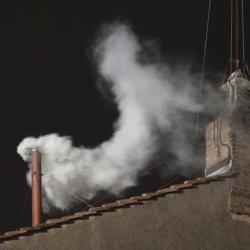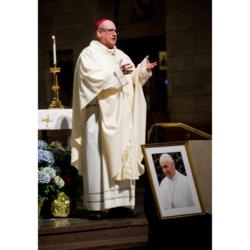Two parish closures delayed
The archdiocese announced on Oct. 16 that the closure of two parishes — St. Bernard in West Newton and St. Mary of the Angels in Roxbury — would be delayed.
“The decision to delay these closings was made by Archbishop Seán O’Malley with consultation from a number of parties including the reconfiguration review committee,” said an archdiocese press release announcing the delay.
St. Bernard will remain open for worship on Sundays until further notice “to provide more time for the archdiocese to work with parishioners there,” the press release said. A special liturgy is planned on Oct. 24 celebrating 130 years of service to West Newton.
“I appreciate the acknowledgement of the difficulties that many of my parishioners are experiencing in closing this parish. It is my hope that we are able to use this time to continue the process with constructive conversation,” said Father Paul Kilroy, who has served as the pastor at St. Bernard’s for three years.
St. Mary’s will remain open for two more years “in order to provide the community continued assistance in reducing the neighborhood violence,” said the release. “We are pleased to have the opportunity to serve our church community and the larger neighborhood in whatever ways will be most helpful,” said St. Mary’s pastor, Father David Gill, SJ.
The archbishop said, “While the reconfiguration process must continue, I recognize the need to communicate more fully our vision and plans to the parishioners impacted.
“My hope is that by delaying the closing of St. Bernard’s, we will be able to provide additional assistance to the parishioners who are finding this process particularly difficult. At St. Mary of the Angels, the archdiocese desires to provide a pastoral presence to the surrounding neighborhood in light of a recent increase in crime and a concern for the well being of local residents.”
Meanwhile, parishioners at an East Boston parish, which closed earlier this month, continued to occupy their church in an effort to convince the archdiocese to reverse the decision to close their parish.
Parishioners of Our Lady of Mount Carmel began their sit-in after the official closure of the parish on Oct. 12. Originally, plans for a sit-in seemed to be averted after an agreement with the archdiocese, in which the archdiocese planned to allow Mount Carmel’s convent to remain open as a religious-education center for a neighboring parish.
“Last week, members of Our Lady of Mount Carmel Parish, received word that Archbishop Se·n O’Malley had accepted the parishioners’ proposal to use the Mount Carmel convent as a religious-education center, youth-activities center and chapel, where it is expected that Mass will be celebrated, as expanded facilities of Sacred Heart Parish,” said the archdiocese in a statement dated Oct. 14. “The archdiocese will be convening a meeting at Sacred Heart Parish to discuss the plans for use of the convent in more detail. The archbishop reiterates his commitment to honoring this promise to the Mount Carmel parishioners.”
The press release also acknowledged that “a handful of parishioners with a long-standing connection to this parish community” are “having difficulty accepting the closing.”
“We are very respectful of their sentiments, but hope they will find the comfort necessary to join their new parish community,” it stated.
The statement also gave reasons for the closure of Mount Carmel, including a decline in activity over the past decade, the parish being unable to financially support the priests assigned to the parish for the last two years, and church repairs.
“The Immaculate Conception Province of the Franciscan Friars, who had assigned Franciscan priests to staff the parish for many years, informed the archdiocese that they are no longer planning to staff the parish,” the statement also noted.
Shortly after beginning their sit-in, it was announced that Mount Carmel parishioners had allied themselves with a group formed to represent the interest of parishioners of parishes that have closed or are slated to close.
The group, calling itself the Council of Parishes, has members belonging to 10 different parishes or former parishes, said co-chair Peter Borre.
Speaking to The Pilot, Borre criticized the reconfiguration process saying the criteria set out for suppressions was not observed in several cases, and some cluster recommendations were not followed and never explained. In addition, he said the cluster process itself pitted faith groups against each other.
The archdiocese has said that statistics, such as a parish’s sacramental index, were intended to serve as guides, not as criteria, for parish closures and that cluster recommendations were not binding.
Borre, a parishioner of St. Catherine of Siena in Charlestown, said of the three parishes in Charlestown at least one, maybe two, parishes are not needed. While he supports the need for recon-figuration, the process is flawed, he said.
He said reconfiguration could be improved by opening “satellite chapels” or providing shuttle van service for the elderly and people in poor areas.
Council co-chair Cynthia Deysher, a former parishioner of St. Anselm Parish in Sudbury which closed Sept. 15, said the answer lies in having part-time pastors, as St. Anselm had before closure, greater participation of lay people, and strong parishes assisting inner-city parishes.
“What happened is really a travesty,” said Deysher. “You couldn’t employ worse techniques.”
Vibrant parishes should never close, and the council of parishes hopes to save them, she added. The council has members formerly belonging to three closed parishes: St. Anselm, St. Albert the Great in Weymouth and Our Lady of Mount Carmel in East Boston.
In addition, the group has said that parishioners from St. Catherine, St. Jeremiah in Framingham, St. Susanna in Dedham, St. Thomas the Apostle in Salem, Sacred Heart in Lexington, St. Bernard in West Newton and St. Thomas in Salem, have joined the council.
